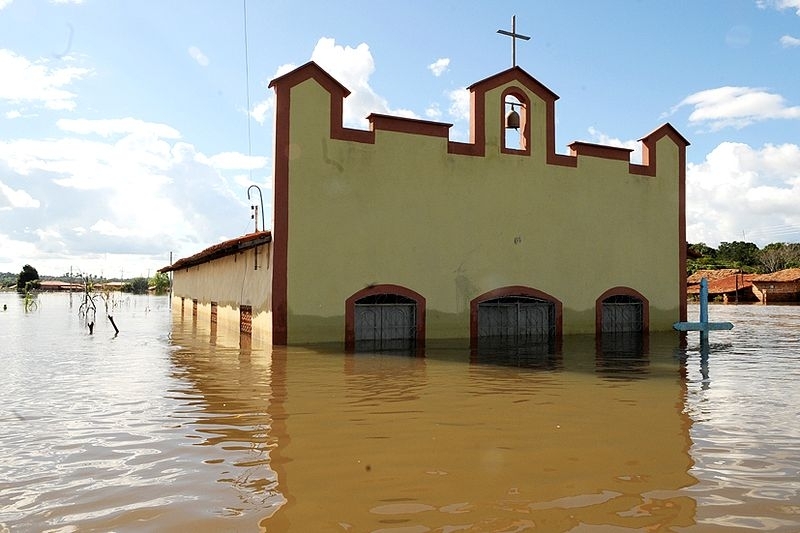


Project conducted by researchers from Brazil, the United Kingdom and Germany, with support from FAPESP and other agencies, investigates the flow of information between parties involved in flood monitoring (photo: Antonio Cruz/Agência Brasil)
Published on 05/13/2021
By Heitor Shimizu, in London | Agência FAPESP – When there is a flood – a common phenomenon in the daily life of Brazilian cities – the alerts generated by monitoring centers are critical for preparing the population and avoiding loss of life.
These centers work with data obtained using scientific tools that help predict such occurrences, but there are other types of information that is also important, and that information could reduce the impact of such disasters. They are the notifications sent by residents of the affected areas, who understand the scope of the problem better than anyone else.
Disruption caused by flooding is on the increase as a result of global climate change. Because of this, a new research project aims at investigating how to improve the flow of information between parties involved in events such. It is an international initiative that is being carried out by scientists from several locations.
Entitled “Waterproofing data: engaging stakeholders in the sustainable governance of flood risks for urban resilience,” the study is being led by Maria Alexandra da Cunha, a professor in the School of Business Administration at the Getúlio Vargas Foundation (FGV).
It was one of the four projects selected in January in a call for proposals issued by FAPESP together with the Belmont Forum, an international partnership that funds environmental change research.
“‘Waterproofing data’ refers to the flow of data, especially the flow of data that occurs during flood events,” said Cunha in London, where she was one of the speakers at FAPESP Week London, a symposium held February 11-12, 2019 at the Royal Society in London.
“We are going to develop three methods. One is to improve and make visible the flow of flood-related data among centers of expertise. The second is to enhance the way citizens engage with the production and flow of flood data. And third is to make locally produced data usable by centers or expertise, and vice versa, using collaborative mapping platforms,” she told Agência FAPESP.
Cunha says that the project aims to involve citizens to “produce, circulate and utilize data that incorporates past flooding experiences and local knowledge about the risk of flooding in order to increase community resilience.”
“We want to integrate citizen-generated data with other types of data, whether it be sociodemographic or generated by environmental sensors and risk mapping, as a way to support decision making and public policy formation as it relates to flooding,” she said.
“Basically, what we want to do is change the practices surrounding the management of flood data, and eventually translate that data to other sites. This will be done through a close partnership between our project and local governments in Brazil, Germany and the United Kingdom,” the researcher said.
International partnership
Cunha explains that the team involves researchers from three academic institutions: the Getúlio Vargas Foundation (the Center for Public Management and Government Studies), the University of Warwick, with João Porto de Albuquerque as principal investigator, and the University of Heidelberg, with the group led by Alexander Zipf.
“We also have a large number of partners, such as the National Disaster Surveillance and Early Warning System (CEMADEN), São Paulo City Hall and the Acre State Government, through its State Environmental Office. Other collaborators include our Advisory Board, which will take part in wide-ranging discussions,” said Cunha.
The researcher emphasized that the international collaboration is being funded by the Belmont Forum, the Economic and Social Research Council in the United Kingdom, FAPESP in Brazil, and the Ministry of Education and Research (BMBF) in Germany.
“This funding is very important because we are experiencing extreme events like floods in places all over the world, and the project enables researchers from the United Kingdom, Germany and Brazil to work together and learn from each other. It is particularly important for us since it deals with knowledge generated in Brazil that could provide information to the Northern Hemisphere,” she said.
According to Cunha, rethinking how flood-related data is produced, and how it flows, can help build sustainable, flood-resilient communities.
“In the final analysis, these interventions will change the way flood-related data is produced and flows, creating new governance arrangements between citizens, governments and flood experts, and, ultimately, increase community resilience with regard to floods,” she said.
Cunha also leads the FAPESP Thematic Project “Smart governance in sustainable cities (Smartgov),” in collaboration with researchers from the University of Stirling (Scotland) and Utrecht University (The Netherlands).
Learn more about FAPESP Week London at: www.fapesp.br/week2019/london.
Source: https://agencia.fapesp.br/29819